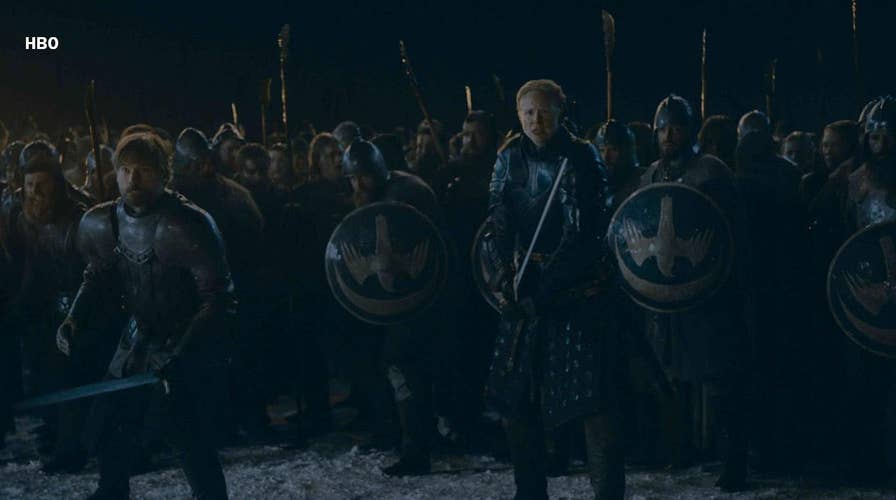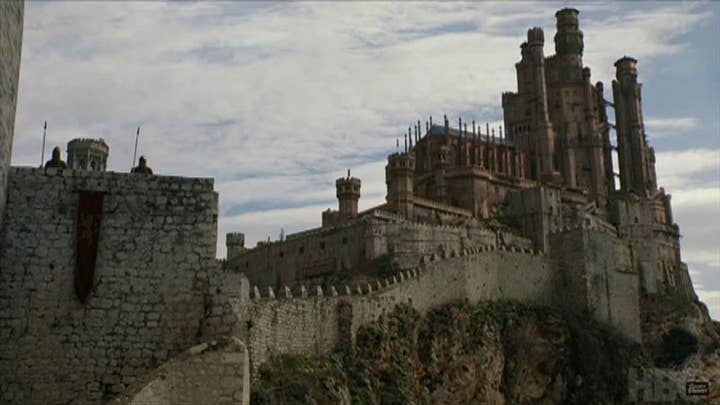'Game Of Thrones' fans gripe about lighting during epic episode
Several 'Game of Thrones' fans complained they had to re-watch parts of the Battle of Winterfell because of dark cinematography.
Normally, my eyes roll when someone says fiction can teach us about war. Who needs fiction when there is so much real war to study?
Yet all the water cooler talk this morning centers on “Game of Thrones.” And as I reflect on the imaginary saga spun by George R.R. Martin, my eyes aren’t rolling.
As the survivors of Winterfell tend to their wounds and grimly face the next battle for the Seven Kingdoms [Warning: Lots of spoilers coming. Sorry.], I’m considering that this might be the moment to concede there is something worth remembering about the clash of fire and ice in the fight for the fictitious North.
And that something is simply this: None of the actual battle for Winterfell makes any sense.
For starters, there’s the complete misuse of dragons. They are the GoT equivalent of today’s long-range missiles, bombers, and artillery. Send them out to thin the enemy ranks before the battle is joined. Martin should have studied U.S. military AirLand Battle doctrine from the 1980s, not feudal jousting.
Then there’s the cavalry. You never send them out against the enemy’s main force unsupported. No wonder no Dothraki came back alive!
And the waste of obstacles. Of course, you want to hinder an enemy’s advance, but for maximum effectiveness, you have to protect the obstacles to advance with covering fire. No surprise the dead crashed so easily across the fire moat in front of Winterfell.
What makes least sense of all of is that virtually every great captain of the Seven Kingdoms took part in the battle, and between them, they made literally dozens of rookie mistakes.
Which is why no serious person would ever read fiction to learn how to fight a war.
Martin, the author of the books that inspired the HBO series, has said his battle scenes were inspired by his readings about the War of the Roses, the dynastic struggle between the Lancasters and Yorks in medieval England. Big deal. Shakespeare based Henry V on the English invasion of France, but it, too, contains no sound lessons in military history. In the end, writers make fiction not fact because they want to transcend the facts to tell their story – their way.
Lots of fiction – from Stephen Crane’s “War is Kind” poetry to Steven Spielberg’s D-Day cinema – treats the topic of war. What makes some of it great – and what qualifies GoT to join their ranks – is when they get the most important part right.
War is a competition among thinking, scheming, determined foes who are thrown in a blender and mixed with a combination of bad weather, unforeseen surprises, missteps, stupidity, luck, and mud. It’s this noxious brew of human determination, human foibles, and real-life messiness that always makes the outcome of battle uncertain.
Virtually every metaphor for war – a game of thrones, a chess match – fails because it refers to human activities that are bound by rules. War transcends rules. That’s also why it is bad to use war as a metaphor for every cause or initiative, from the “war on drugs” to the “war on pet obesity.” War is harsh, deadly, physical violence. Great war narratives never let that reality slip from the fabric of their stories.
And it is on this point that the writers, directors, and producers of the Battle of Winterfell succeeded extremely well. They delivered, for over an hour, a vivid portrayal of confusion, messiness, and gore galore. Half the time I couldn’t figure out what the hell was happening, and I’ve watched all seven seasons of the show. That’s the fog of war.
Winterfell also had something to say about the timeless and important question of why we fight. People take up arms for a variety of reasons. The noblest reason is to fight for a just cause.
The people of the North fighting for the survival of the Seven Kingdoms is such a cause, and it doesn’t seem fictional because we know that just causes have animated warriors in real life – from Bunker Hill to Gettysburg; from the beaches of Normandy, across the frozen Chosin, to Tora Bora and Mosul.
CLICK HERE TO GET THE FOX NEWS APP
There are those who are willing to stand and fight for the rest of us – and that human compulsion is often the only measure that has divided the earth between darkness and liberty.
The Battle of Winterfell also captured another core reality of war. No matter what led each soldier to the battlefield, many stay in the fight because of those who stand beside them. The latest GoT episode provided examples of this by the score. They move us because we know of their real-life models. Some were named Sergeant York or Butch O’Hare. Others were just “everyday joes,” whose courage and sacrifice are known only by their families and friends. Still, others are known but to God, beneath the Tomb of the Unknown Soldier.










































